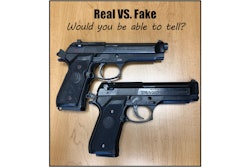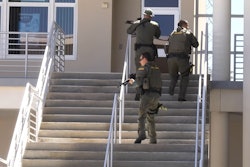During the annual ILEETA conference in St. Louis earlier this year, one of the speakers during the Emerson Hour was Graham Tinius, training coordinator of the National Association of Field Training Officers. During his talk, Tinius explained how one statement from Mother Theresa has helped to inform and influence his police career, and how he now uses that same quote in his work as a law enforcement trainer.
Tinius explains how the quote—"If you can't feed a hundred people, then feed just one"—helps him explain the impact of addressing things one at a time, as well as compartmentalizing bigger concepts. It also provides a framework for understanding the larger impact each officer can have with just one successful act on patrol.
Tinius told POLICE Mag during a Coffee Break with POLICE Experts video interview, "As a cop, I can't stop everyone from being victimized, but if I do my job correctly, maybe I stop one person from being victimized. I can't arrest all the criminals, but if I do my job correctly, maybe I can arrest one and have one prosecuted. Small victories like that that really speak to me."
Police trainers frequently use quotes and historical references to hammer home their instruction for a variety of reasons. Perhaps most importantly, tying well-known maxims and mantras to whatever subject is being taught often has the effect of making the memory of that message more long-lasting.
Here are five quotes utilized by five notable law enforcement trainers.
The Sound of Silence
"The sounds of silence cannot be misquoted—they can be misunderstood or misinterpreted but never be misquoted."
—Colonel "Coach" Bob Lindsey, Jefferson Parish (LA) Sheriff's Office (Ret.)
"One of the greatest mistakes that officers—and, in fact, all humans—make is to immediately react to what someone says or does and not taking the time to process the information" says Gary Klugiewicz a longtime police trainer and member of the training cadre at Vistelar. "This impacts life on the street, in the stationhouse, and in the home. In our Vistelar training, we make a big thing of understanding the difference between reacting and responding."
Klugiewicz says that reaction is "immediate, emotional, without thought and very dangerous" and adds that "responding can be immediate, it is a non-emotional, well thought out, pre-planned practice response."
Klugiewicz concludes, "One of my favorite responses that I say when I have done it right is to say, 'What did Klugiewicz say?' The answer is that Klugiewicz didn't say anything. You may misunderstand or misinterpreted what I said but you won't have a damaging soundbite of what came out of my mouth in the heat of the moment that can severely hurt outcomes and the defense of my response."
The Leader's Role
"The leader's role is to define reality, then give hope."
—Napoleon Bonaparte
"The majority of my work is with leaders and change agents. Inevitably we always find ourselves discussing the challenges of communicating the realities of a situation with constituents" says, Joe Willis, Chief Learning Officer, First H.E.L.P.
"We want our leaders to tell it like it is," Willis explains. "No matter how dire or bleak the situation is, leaders of character and integrity will speak candidly about the problem without sugar-coating. Then with confidence and candor inspire shared vision of a future where hard work and shared struggle will resolve the current conditions."
The Nine-layered Heavens
"When the time comes to strike, you must strike like thunderbolts from the nine-layered heavens!"
—Sun Tzu
"During impact training—when it was time to impress upon my students the need for powerful impact when your life depended on them—I would use this quote to emphasize the need for power when facing a violent physical attack," says Lieutenant (ret.) Dan Marcou, La Crosse (WI) Police Department.
Marcou, also the author of several books, including the recently released "Street Survival II," says, "I would say it with emphasis as well as a bit of showmanship demonstrating one of their techniques at nearly full power. It would draw out more power in their techniques."
Marcou says that on one occasion it was raining outside and right as he finished the words 'from the nine-layered heavens!' lighting struck and thunder rolled.
Marcou says, "It made an even greater impression on the students who never forgot that moment in training."
The Fight Picks You
"You do not pick the fight, the fight picks you. A fight will not be what you want it to be. It will be what it is, and it will be ugly."
—Dave Spaulding
Duane Wolfe—who recently retired from his second career as a law enforcement instructor at Minnesota Technical College after serving more than a quarter century as an officer in the Land of 10,000 Lakes—says, "Too often in a critical situation officers are overwhelmed by the thought that, 'This can't be happening.' One of the reasons is that the scenarios that we play in our head may bear no resemblance to the reality of a confrontation. Instead it follows some Hollywood-type script. If you mental imagery practice always involves you prevailing without a scratch against one opponent in a stand up gunfight, you are may be setting up yourself for an unpleasant surprise."
Wolfe adds, "You do not pick the day, the time, the place, the circumstance, or your opponent(s). All you get to pick is your response. That response will be predicated on your training."
Wolfe tells of one instance in which one of his students responded to a domestic and on the approach he was ambushed, shot in both legs, and ended up on the ground shooting one handed.
Wolfe says, "His thoughts were, 'I have been here before in training. I can win.' He did, his assailant didn't."
The Slide Toward Mediocrity
"No matter how much you have achieved, you will always be merely good relative to what you can become. Greatness is an inherently dynamic process, not an end point. The moment you think of yourself as great, your slide toward mediocrity will have already begun."
—Jim Collins (author of Good to Great)
Brian Willis—deputy executive director of the International Law Enforcement Educators and Trainers Association (ILEETA) and President of Winning Mind Training Inc.—says, "One of the concepts we explore in both the Dare to Be Great leadership workshops and the Excellence in Training courses is the importance of committing to the pursuit of excellence. This requires the commitment to be just a little bit better tomorrow that you are today through small, incremental, daily improvement."
Willis adds, "In his book 'Atomic Habits,' James Clear talks about striving to be 1% better every day. I share a concept I borrowed from some mental performance coaches of committing 1% of every day, which is 14 minutes and 24 seconds, to personal growth and development to help achieve that 1% daily improvement."
Willis says that the key is to develop a growth mindset and to establish habitual behaviors to support that mindset.
"These habits can involve as little as 10 minutes a day of training and 10 minutes a day of reading," Willis says. "It can also involve turning your vehicle into a Learning Lab on Wheels to maximize your commute time by listening to audio books and educational podcasts. This quote from Jim Collins helps reinforce the philosophy that the moment we start to think we are great in any role—leader, trainer, communicator, etc.—we will stop doing the work and our slide towards mediocrity will have begun as the only direction we can coast for a prolonged period is downhill."
The End of the Beginning
These are but a handful of examples offered by a small circle of trainers. In coming weeks, we'll revisit this topic again with another group of notable quotes that can help law enforcement instructors in their ongoing mission of ensuring the safety and success of the men and women they teach.
As Winston Churchill once famously said, "Now this is not the end. It is not even the beginning of the end. But it is, perhaps, the end of the beginning."
















